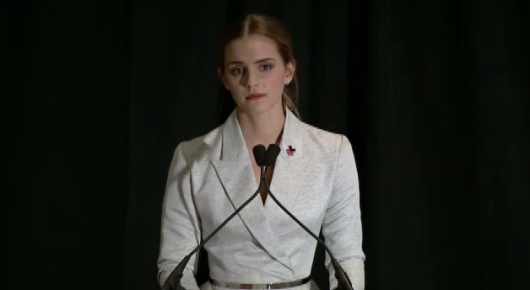
British actress and UN Women goodwill ambassador Emma Watson speaks about feminism and a new UN Women campaign Sept. 20 at the UN in New York City.
Screenshot of UN YouTube video
Sometimes it feels like people are missing the point.
Emma Watson stood up in front of the United Nations and talked about the UN Women campaign, He For She, that aims to achieve gender equality partially by inviting men to join the conversation. She spoke of issues many women and men face — girls being called bossy instead of leaders; boys struggling to figure out their identity among all of the words used to describe masculinity.
The issues she talked about weren’t new, or rare, or revolutionary. They were all things that have been talked about for years, and Watson knew that. But putting a face on feminism, assigning a woman who is strong, confident, intelligent and poised to represent the movement toward gender equality — through the UN no less — is powerful and more directly seeks change.
But it seems to me that some people must have gotten something different out of it.
When I googled “Emma Watson UN speech” on Sunday night, a good portion of the results were about Watson’s put-together outfit, a “belted white coat dress,” as some called it.
…What? Who cares?
Watson gave this amazing speech seeking equality, summarizing why people should be feminists even if they hate the word, even acknowledging that some will see her as the “Harry Potter girl” — and people, news outlets, chose to comment on what she was wearing.
This has to be a joke.
Yeah, she had a nice dress on, but who wouldn’t when speaking in front of the UN? Who wouldn’t when addressing the topics she addressed? It feels like they missed the substance and weight of what she was talking about.
But really, I shouldn’t be surprised. It was exactly what she was talking about.
It’s time, though, for people to put aside appearances and material notions and to focus on treating women the same way men are treated, both socially and in the workplace.
I’ve had a lot of the same privileges Watson said she had. I have parents who love me and who encourage me to do whatever it is I want to do, regardless of gender. I’ve had mentors push me to be all that I can be. And, like Watson, I’ve never had my school limit me because I was a girl.
Watson called those people “the inadvertent feminists who are changing the world today.”
She’s right. And we quite obviously need more of them.


